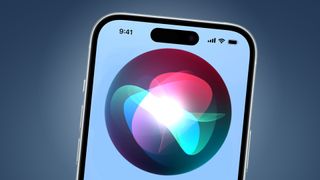ChatGPT is widely seen as one of the best artificial intelligence (AI) tools available right now. Siri? Not so much. But if a new claim penned by Apple researchers turns out to be accurate, Siri could take a small step towards being a much smarter AI voice assistant.
In a new paper named ‘ReALM: Reference Resolution As Language Modeling’, Apple researchers explain how the company’s AI system will aim to consider both the content that is on your device’s screen and the tasks that you are currently performing (both in the foreground and the background), then use those to respond to your queries.
The purpose of this is to help the AI assistant understand the context of your requests by knowing what image is on screen, what music is playing in the background, or which iPhone alarm just sounded, for instance. And when it can understand context, Apple says, its own AI can offer some impressive performance.
In fact, Apple researchers claim that their AI is able to “substantially” outperform GPT-4, the large language model (LLM) that drives the paid-for ChatGPT Plus, for this particular “reference resolution” task. With that kind of power at its disposal, it suggests that Siri could finally shake its reputation as a sub-par digital assistant.
And it’s not the only ChatGPT rival that seems to be making important progress. Samsung’s Bixby – which, if anything, has an even worse reputation than Siri – is apparently on the cusp of gaining its own generative AI features. If you want an AI chatbot embedded in your phone, it looks like there’s good news on the horizon, whether you’re of an iOS or Android persuasion.
Is a next-gen Siri finally en route?

Trading blows with GPT-4 is no small feat for Apple’s on-device AI, even if that is for just one specific task, as OpenAI’s LLM is considered one of the best AI models in the world right now. If the researchers’ technology were to make it into Siri, it could mark a huge step up for Apple’s much-maligned assistant.
Interestingly, Apple says its largest LLM is the one that substantially outclasses GPT-4 for this ‘reference resolution’ task. Yet even the company’s smallest LLM achieved “performance comparable to that of GPT-4.” If that’s correct, it indicates that Apple’s AI research has produced some pretty impressive results.
That said, there is still work to do, as the paper concludes: “While our approach is effective in encoding the position of entities on the screen, we find that it results in loss of information that may not be able to resolve complex user queries that rely on nuanced positional understanding. We thus believe that exploring more complex approaches such as splitting the screen into a grid and encoding these relative spatial positions into text, while challenging, is a promising avenue of future exploration.”
Apple’s work on next-generation AI is an open secret in the tech world, and it’s widely expected to be the headline feature in iOS 18. Apple is due to announce its latest software updates at WWDC 2024 in June, with Greg Joswiak, Apple’s senior vice president of worldwide marketing, dropping a not-so-subtle hint on X (formerly Twitter) by saying WWDC would be “Absolutely Incredible” (yes, with those same letters capitalized).
We’ll only truly know how good Siri will be compared to ChatGPT’s Voice function once iOS 18 is in the hands of users, but clearly Apple is feeling confident about its progress. And that bodes well for Apple fans who have watched the progress of the company’s AI rivals with more than a touch of envy.